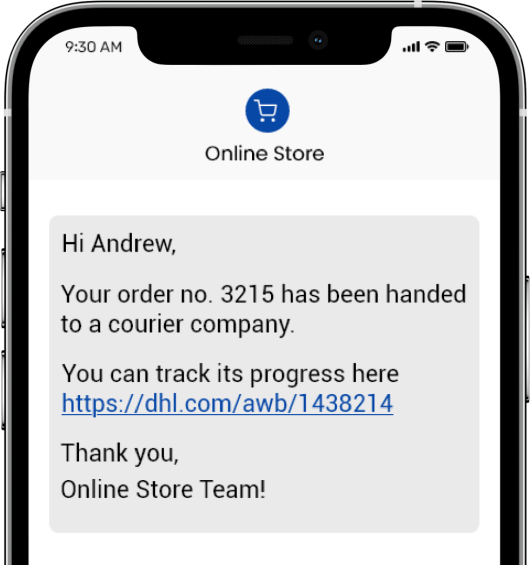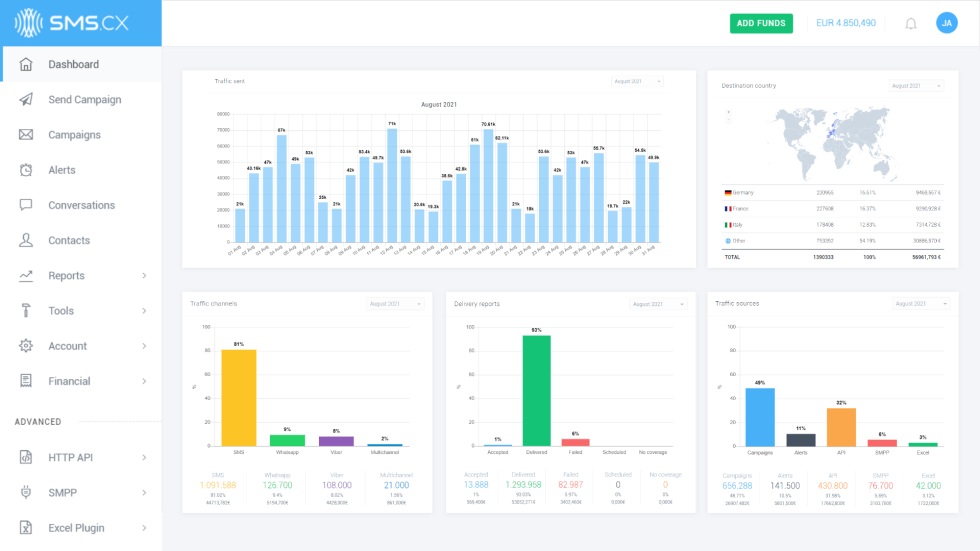SMS-API
Die SMS-API wird von Unternehmen verwendet, um SMS programmgesteuert mit Terminerinnerungen, Benachrichtigungen, Warnungen oder Marketingkampagnen zu senden. Das SMS-API-Gateway ist auch hilfreich für Unternehmen, die SMS-Funktionen in ihre bestehenden Systeme und Anwendungen wie CRM-Systeme oder E-Commerce-Plattformen integrieren müssen.
Die SMS-API wird zum schnellen, effizienten und skalierbaren Senden von SMS von Unternehmen aus vielen Branchen verwendet: Finanzinstitute, Gesundheitsdienstleister, Regierungsbehörden, Lebensmittel und Gastgewerbe, Einzelhändler und viele andere Arten von Organisationen.
Mit unserer SMS-API können Sie SMS an mehrere Empfänger in einer einzigen Anfrage senden (bis zu 25.000 Telefonnummern pro Anfrage), anstatt mehrere einzelne API-Anfragen zu stellen, was Zeit und Ressourcen spart.
 Benachrichtigung über den Bestellstatus
Benachrichtigung über den Bestellstatus
Eine breite Palette von Funktionen für SMS-Messaging
Klicken Sie unten, um Funktions-Highlights für SMS, mobile Zielseiten, unser Webportal oder API-Verbindungen anzuzeigen
-
Schablonen
Speichern Sie einzigartige SMS-Vorlagen, um SMS-Nachrichten schnell und bequem zu senden.
-
Zwei-Wege-SMS
Entwickeln Sie eine Beziehung zu Ihren Kunden. Senden und empfangen Sie Textnachrichten an/von Kunden.
-
Mehrsprachige Unterstützung
Dank der Unicode-Zeichencodierung können Sie Textnachrichten in jeder derzeit verwendeten Sprache senden.
-
Dynamische Felder
Um Nachrichten schnell zu personalisieren, wählen Sie alle Kontaktdetails aus, die dynamisch in den Textkörper aufgenommen werden sollen.
-
Kostenschätzung
Bevor Sie eine Kampagne senden, schätzen Sie die Kosten und machen Sie sich keine Sorgen, dass das Budget überschritten wird.
-
Mehrkanal
Sie haben die Wahl, Ihre Nachricht per SMS, Viber oder WhatsApp zu versenden.
-
Alarmsignale
Erstellen Sie Geburtstags-SMS, Mahnungen für verspätete Zahlungen und andere Warnungen basierend auf einer Datei mit Datumsspalten.
-
Gespräche
Sie können auf alle eingehenden Textnachrichten aus dem Chat-Fenster antworten, das als einzelner Nachrichtenfeed angezeigt wird.
-
Benutzerdefinierte Absender-ID
Senden Sie Nachrichten an Ihre Kunden mit der Absender-ID Ihrer Organisation.
-
Globale Abdeckung
Unser Netzwerk ermöglicht es Ihnen, sicher und kostengünstig mit Ihren Verbrauchern auf der ganzen Welt zu interagieren.
-
Kontakte importieren
Laden Sie eine Datei hoch (CSV, XLS, TXT) oder kopieren Sie Telefonnummern und fügen Sie sie ein, um Ihre Kontaktsammlung schnell zu importieren. Speichern Sie Details wie Ihren Namen, Ihre E-Mail-Adresse und benutzerdefinierte Felder.
-
Benutzerdefinierte Felder
Durch das Hochladen einer Datei mit Kontakten und das Definieren benutzerdefinierter Datenfelder können Sie eine Reihe dynamischer Felder in Ihre Textnachricht integrieren.
-
Aktivitätsprotokoll
Es zeichnet unter anderem Ihre Logins, Saldo-Aufladungen und gesendeten Kampagnen auf.
-
Berichte und Analysen
Überwachen und verbessern Sie Ihre SMS-Marketingergebnisse. Erfahren Sie mehr über Zustellraten, Klickraten und andere Metriken.
-
Zahlen validieren
Um Ihre Kontaktliste zu bereinigen, laden Sie eine Liste mit Telefonnummern hoch und entfernen Sie die ungültigen.
-
Warnung bei niedrigem Kredit
Sie erhalten eine SMS-Guthabenbenachrichtigung, wenn Ihr Kontostand unter das von Ihnen festgelegte Limit fällt.
-
Zugriff einschränken
Ermöglicht es Ihnen, den Kontozugriff auf einen bestimmten IP-Adressbereich zu beschränken.
Beliebte Anwendungsfälle für SMS-APIs
Erfahren Sie, wie Sie unsere SMS-API-Lösung für Ihr Unternehmen nutzen können.
Benachrichtigungen
Verwenden Sie die SMS-API, um Ihre Kunden über Auftragsbestätigung, Versandstatus, Einladungen und Termine zu informieren.
Alarmsignale
Automatisieren Sie schnell und einfach das Versenden von Terminerinnerungen, Updates, Änderungen oder wichtigen Problemen.
Verifizierung
Überprüfen und authentifizieren Sie Benutzer mit Einmalpasswörtern (OTP) als zusätzliche Sicherheitsebene, um unbefugten Zugriff zu verhindern.
Marketing
Verwenden Sie Massen-SMS, um Sonderangebote, Verkaufsaktionen, Rabattcoupons, Gutscheine und mehr zu senden, um Ihren Umsatz zu steigern.
Berechnen Sie die Kosten für das Senden von SMS an United States
Pay-as-you-go-SMS-Preise. Wenn Sie unsere SMS-API verwenden, zahlen Sie nur für das, was Sie nutzen.
0.198 € Kosten pro SMS

Senden Sie SMS-Textnachrichten an ein beliebiges Mobilfunknetz in United States für 0.198 € pro Nachricht. Senden Sie SMS an Mobilfunknetze in United States:
- AT&T
- Choice Wireless (ATN)
- iWireless
- Chariton Valley Telephone Company
- Phoenix Communications (Oklahoma Western Telephone Company)
- T-Mobile (Deutsche Telekom)
- Sprint (SoftBank)
- Verizon Wireless
- US Cellular (TDS)
- Arctic Slope Telephone Association Cooperative
- Big River Communications (Big River Telephone)
- Carolina West Wireless
- CenturyLink
- Northwest Missouri Cellular
- Public Service Data Wireless
- S&T Telephone
- VTel Wireless (Vermont Telephone Company)
- Agri-Valley Communications
- Airpeak
- C Spire Wireless (Telapex)
- NewCore Wireless
- SouthernLINC Wireless (Southern Company)
- GW Wireless (Golden West Telecom)
- Emery Telecom
- GCI
- NTUA Choice Wireless
- Big Sky Mobile (iSmart Mobile)
- All West Wireless (All West Communications)
- Choice Wireless
- Appalachian Wireless
- Blanca Telephone Company (Jade Communications)
- Bluegrass Cellular
- Cellcom (Nsight)
- Chat Mobility
- Cellular One (MTPCS)
- Cellular One (Smith Bagley)
- ClearTalk Wireless (NTCH)
- Copper Valley Telecom
- Cordova Wireless Communications (Cordova Telephone Cooperative)
- Bravado Wireless (Cross Communications)
- Custer Telephone Company
- ETEX Telephone Cooperative
- Farmers Wireless
- Illinois Valley Cellular
- Limitless Mobile
- Indigo Wireless
- Inland Cellular
- Leaco Wireless
- Bug Tussel Wireless (Hilbert Communications)
- Mid-Rivers Communications (Mid-Rivers Telephone Cooperative)
- Mobi PCS
- Matanuska Telephone Association
- Nemont (Sagebrush Cellular)
- Nex-Tech Wireless
- OTZ Telephone Cooperative
- Kaptel
- Penasco Valley Telecom
- Peoples Wireless (Peoples Telephone Cooperative)
- Pine Belt Wireless (Pine Belt Telephone Company)
- Pine Cellular
- Pinpoint Communications
- Pioneer Cellular (Pioneer Telephone Cooperative)
- Plateau Wireless
- Shenandoah Telecommunications
- Silver Star Wireless (Silver Star Communications)
- Snake River PCS (Eagle Telephone System)
- South Central Communications
- Swiftel (Brookings Municipal Utilities)
- Texas Cellular Communications
- STRATA NETWORKS
- Union Wireless
- United Wireless
- Viaero Wireless
- West Central Wireless
- Northeast Wireless
- Ligado Networks
- BayRICS
- Texas Energy Network
- James Valley Telecommunications
- PTCI (Panhandle Telephone Cooperative)
- MobileNation (SI Wireless)
- TelAlaska Cellular (American Broadband)
- S & R Communications
- SpeedConnect
- O2 Secure Wireless
- NNTC Wireless (Northeast Nebraska Telephone Company)
- ARINC AviNet (Rockwell Collins)
- Enhanced Telecommunications Corporation
- South Georgia Regional Information Technology Authority
- Aspenta
- Nortex Communications
- Colorado Valley Communications
- KPU (Ketchikan Public Utilities)
- Evolve Broadband (Worldcall Interconnect)
- Adams NetWorks
- Farmers Mutual Telephone Company
- CTC Advanced Communications
- NNTC Wireless (Nucla-Naturita Telephone Company)
- Breakaway Wireless (MTCC)
- Blue Wireless
- BIT Communications (Buggs Island Telephone Cooperative)
- pdvWireless (Pacific DataVision)
- Rock Wireless (Standing Rock Telecom) (5938)
- Redzone Wireless
- GigSky
- Rise Broadband
- Country Wireless
- Phoenix Wireless
- Infrastructure Networks
Überprüfen Sie die Funktionen von SMS-Nachrichten und lokale Vorschriften auf United States:
Möglichkeiten, SMS-Nachrichten mit SMS zu verwenden. CX
Wählen Sie eine Methode zum Senden Ihrer Textnachricht aus, die Ihren Geschäftsanforderungen entspricht.
Codebeispiele für SMS-API
Integrieren Sie unsere leistungsstarke SMS-API in Ihre Website oder Anwendung, und Sie können in wenigen Minuten mit dem Senden von SMS-Nachrichten beginnen.
Verwenden Sie unsere offiziellen API-Wrapper und Client-Bibliotheken, um schnell loszulegen. Sie sind mit gängigen Sprachen wie Python, PHP, Node.js, Java und anderen verfügbar.
Es gibt keine Clientbibliothek für Ihre bevorzugte Sprache? Sie können eine beliebige generische HTTP-Bibliothek verwenden.

import requests url = "https://api.sms.cx/sms" payload = { "to": ["+31612469333"], "from": "InfoText", "text": "Your confirmation code is 5443" } headers = { "content-type": "application/json", "Authorization": "Bearer <ACCESS_TOKEN>" } response = requests.request("POST", url, json=payload, headers=headers) print(response.text)
require 'uri' require 'net/http' require 'openssl' url = URI("https://api.sms.cx/sms") http = Net::HTTP.new(url.host, url.port) http.use_ssl = true http.verify_mode = OpenSSL::SSL::VERIFY_NONE request = Net::HTTP::Post.new(url) request["content-type"] = 'application/json' request["Authorization"] = 'Bearer <ACCESS_TOKEN>' request.body = "{\"to\":[\"+31612469333\"],\"from\":\"InfoText\",\"text\":\"Your confirmation code is 5443\"}" response = http.request(request) puts response.read_body
const data = JSON.stringify({ "to": [ "+31612469333" ], "from": "InfoText", "text": "Your confirmation code is 5443" }); const xhr = new XMLHttpRequest(); xhr.withCredentials = true; xhr.addEventListener("readystatechange", function () { if (this.readyState === this.DONE) { console.log(this.responseText); } }); xhr.open("POST", "https://api.sms.cx/sms"); xhr.setRequestHeader("content-type", "application/json"); xhr.setRequestHeader("Authorization", "Bearer <ACCESS_TOKEN>"); xhr.send(data);
const http = require("https"); const options = { "method": "POST", "hostname": "api.sms.cx", "port": null, "path": "/sms", "headers": { "content-type": "application/json", "Authorization": "Bearer <ACCESS_TOKEN>" } }; const req = http.request(options, function (res) { const chunks = []; res.on("data", function (chunk) { chunks.push(chunk); }); res.on("end", function () { const body = Buffer.concat(chunks); console.log(body.toString()); }); }); req.write(JSON.stringify({to: ['+31612469333'], from: 'InfoText', text: 'Your confirmation code is 5443'})); req.end();
<?php $curl = curl_init(); $payload = [ 'to' => '+31612469333', 'from' => 'InfoText', 'text' => 'Your confirmation code is 5443', ]; curl_setopt_array($curl, [ CURLOPT_URL => "https://api.sms.cx/sms", CURLOPT_RETURNTRANSFER => true, CURLOPT_ENCODING => "", CURLOPT_MAXREDIRS => 10, CURLOPT_TIMEOUT => 30, CURLOPT_HTTP_VERSION => CURL_HTTP_VERSION_1_1, CURLOPT_CUSTOMREQUEST => "POST", CURLOPT_POSTFIELDS => json_encode($payload), CURLOPT_HTTPHEADER => [ "Authorization: Bearer <ACCESS_TOKEN>", "content-type: application/json" ], ]); $response = curl_exec($curl); $err = curl_error($curl); curl_close($curl); if ($err) { echo "cURL Error #:" . $err; } else { echo $response; }
OkHttpClient client = new OkHttpClient(); MediaType mediaType = MediaType.parse("application/json"); RequestBody body = RequestBody.create(mediaType, "{\"to\":[\"+31612469333\"],\"from\":\"InfoText\",\"text\":\"Your confirmation code is 5443\"}"); Request request = new Request.Builder() .url("https://api.sms.cx/sms") .post(body) .addHeader("content-type", "application/json") .addHeader("Authorization", "Bearer <ACCESS_TOKEN>") .build(); Response response = client.newCall(request).execute();
var client = new RestClient("https://api.sms.cx/sms"); var request = new RestRequest(Method.POST); request.AddHeader("content-type", "application/json"); request.AddHeader("Authorization", "Bearer <ACCESS_TOKEN>"); request.AddParameter("application/json", "{\"to\":[\"+31612469333\"],\"from\":\"InfoText\",\"text\":\"Your confirmation code is 5443\"}", ParameterType.RequestBody); IRestResponse response = client.Execute(request);
package main import ( "fmt" "strings" "net/http" "io/ioutil" ) func main() { url := "https://api.sms.cx/sms" payload := strings.NewReader("{\"to\":[\"+31612469333\"],\"from\":\"InfoText\",\"text\":\"Your confirmation code is 5443\"}") req, _ := http.NewRequest("POST", url, payload) req.Header.Add("content-type", "application/json") req.Header.Add("Authorization", "Bearer <ACCESS_TOKEN>") res, _ := http.DefaultClient.Do(req) defer res.Body.Close() body, _ := ioutil.ReadAll(res.Body) fmt.Println(res) fmt.Println(string(body)) }
curl --request POST \ --url https://api.sms.cx/sms \ --header 'Authorization: Bearer <ACCESS_TOKEN>' \ --header 'content-type: application/json' \ --data '{"to":["+31612469333"],"from":"InfoText","text":"Your confirmation code is 5443"}'






